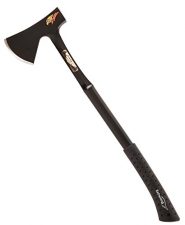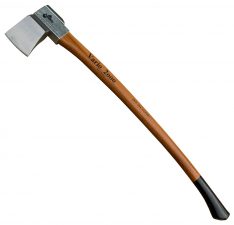This post was originally published in Surviving Prepper
Written by Marc
When the SHTF and there is no electricity or fuel, hand tools and the knowledge of how to use them, will be incredibly important. When you escape to the woods the almighty axe is the go-to tool. Axes can be used to fell a tree, build a shelter, chop firewood, and even defend yourself if needed.
There are many different types of axes. Some have very specific purposes, while others are a little more versatile. In this article I focus on four specific types of axes — hatchet, limbing, felling, and splitting — but at the end of the article you’ll find some less common axes. Each of the four main axe categories includes links to several options that are available on Amazon, or other sites.
Remember that a good quality tool that will last you a lifetime is not typically cheap. Yes you could buy a $17 hatchet. But you really shouldn’t if you want it to stay sharp and be a dependable tool.
Hatchet
A hatchet is a small and light one-handed axe. The typical length is only around one foot, so wearing a hatchet on your belt is comfortable. Having a hatchet in your Bug Out Bag is a must. Keeping one in your car trunk is a great idea too. Hatchets can cut down small trees, split firewood, be used as a campsite hammer and much more.
Here are some good quality hatches that are available on Amazon. The least expensive is on the left (starting off around $40) and each one after is a little more pricey.
| Gerber 14? Hatchet | Estwing Sportsman’s Axe | Hults German Hatchet | Helko Swedish Hatchet |
|---|---|---|---|
 |
 |
 |
 |
Limbing
A limbing axe should be introduced after a felling axe. But because the axe is lighter and shorter, I’ll speak about it first. A limbing axe is most commonly used for cutting the limbs off of a tree after it has been cut down (or felled). The bit (or head) weight and the haft (or handle) of the axe are both double that of the hatchet. The unusual length makes for a very versatile axe for general use. It is light enough for one handed use and long enough for two handed axe.
| Estwing 26-Inch Camper’s Axe | Husqvarna Multipurpose Axe | Wetterlings Hudson Bay Axe | Gransfors Bruks, Small Forest Axe |
|---|---|---|---|
 |
 |
 |
 |
Give me six hours to chop down a tree and I will spend the first four sharpening the axe. – Abraham Lincoln
Felling
A felling axe is the perfect tool for cutting down trees. They are “full size” and two handed axes. They are designed with an extremely sharp, thin bit and tapered head to cut across the wood grain as deeply as possible with every swing.
| Hults Bruk Atran Felling Axe | Hultafors Swedish Felling Axe | Wetterlings Appalachian Forest Axe | Gransfors Bruks American Felling Axe |
|---|---|---|---|
 |
 |
 |
 |
Splitting
A splitting axe, or Maul axe, are the heavy hitters of all the axe types. The other axes can be packed if wanted. But this beast typically stays at the bug out cabin. With a long haft and a heavy concave bit this axe is used to strike the end of a log and split it into smaller pieces.
| Fiskars X27 Splitting Axe | Helko Vario 2000 Log Splitter | Leveraxe Splitting Axe | Gransfors Bruks Splitting Maul |
|---|---|---|---|
 |
 |
 |
 |
Axe Type Overview
| Type | Bit Weight | Haft Length |
|---|---|---|
| Hatchet | 1 ½ pounds | 12 – 14 inches |
| Limbing | 2 pounds | 24 inches |
| Felling | 3 – 4 pounds | 36 inches |
| Splitting / Maul | 8 pounds | 40 inches |
Having an great quality tool is useless unless you know how to use it. Buy one or two at a time and practice using them!
Other Axes that are interesting
If you are interested in building log cabins, I strongly suggest looking at the full line of quality tools at Gränsfors Log-building and Carpentry Tools. For inspiration I’d suggest this amazing video.
If you are interested in axes to take on a zombie apocalypse, I would head over to the weapon page at Best Zombie Stuff. They link to some pretty wicked looking axes!!
About the Authors:
Marc and Lisa write the Surviving Prepper blog. Two city-dwellers staring squinty-eyed and freaked out into the future with the very real understanding that we, as we live now, are seriously screwed should we find ourselves in a SHTF situation within the next 5-10 years. So we’re doing a lot of thinking, and reading, and practicing, and doing. Trying to get ourselves prepared to a level where we could support and defend our family if need be. We aren’t there yet, but we’re learning. We’d like it if you’d come learn with us. Read what we have to offer, and feel free to instruct us in areas where you see we are lacking.
SurvivingPrepper will have an steadily-increasing variety of articles on different “prepper” topics covering homesteading, self-defense, guns, archery, food preservation, alternative cooking methods, and any other relevant prepping topics that come to mind as time goes by. The primary writers for the site are Marc and Lisa, but we will have regular posts from people in our lives who are far more progressed along the prepping road than we are.
If you’d like to know about us, and how we came to be awakened to, and increasingly aware of, the tenuously unprepared situation our society has worked itself into, read About Us here.


I like the article and the ax comparisons, but I mostly wanted to drop a comment to say that I was enjoying the new website layout. Nice reconstruction.
Thanks for stopping by Jacob! Appreciate the comment.